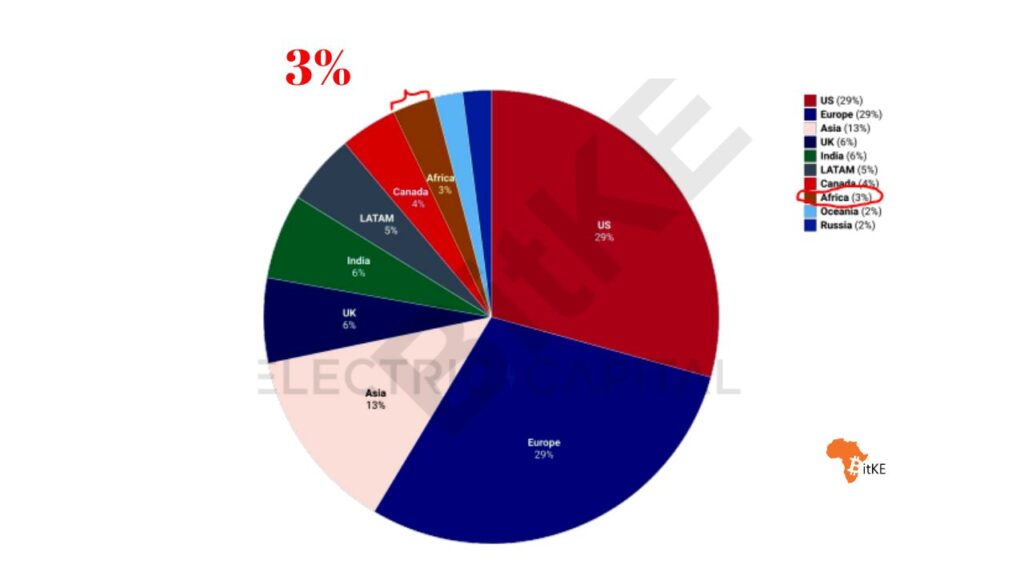Markus Levin, co-founder of XYO, provides inspiring sentiments of the crypto industry, citing that in spite of the radical upswing of the market, the true momentum of the industry lies within the relentless activity of blockchain developers.
In Brief
- Blockchain developers are pivotal in building compliance-ready DeFi protocols, privacy-preserving solutions, and AI-blockchain integrations across Africa.
- Regulatory-ready blockchain platforms in Nigeria, Kenya, and South Africa hinge on developers aligning innovation with compliance frameworks.
- AI blockchain integration empowers decentralized data networks, enabling Africa to monetize geospatial datasets and democratize AI training models.
The ladies and gentlemen behind the curtain building real-world solutions from the industry are quietly transforming the ecosystems through blockchain innovations while piggybacking on the crypto markethype.
This article explores how their efforts are shaping the future of decentralized technologies, regulatory frameworks, and AI integrations.
Blockchain Developers Fuel Crypto’s Hidden Momentum Beyond Market Charts
Africa is currently at the center stage of Web3, with the continent having immense potential, especially with the growing need for more developers.
Currently, a monumental shift is underway, with many African nations prioritizing substance over hyper.
Unlike speculative price movements, developers focus more on tangible advancements like DeFi protocols, NFT use cases, and zero-knowledge scalability solutions.
A prime example occurred in the last bear market catalyzed by breakthroughs in decentralized finance and privacy-preserving tech.
Within the continent, what makes Web3 such a viable technology, quite frankly, isn’t the crypto market resilience but rather a blockchain innovation in real-world infrastructure.
CHECK OUT:Bold Vision: Zone’s Regulated Blockchain Ecosystem Sparks Hope
A key development is the emergence of regulatory-ready blockchain platforms that align with evolving compliance standards.
International frameworks like Europe’s MiCA-compliant approach and the US regulatory experiments demonstrate the ongoing shift.
This propels nations like Nigeria, with its recent relaunch of a new regulatory system, and Kenya and South Africa’s overhaul of blockchain adoptions.
Web3 developers are proactively addressing legal challenges, showcasing how the technology can facilitate a new generation of industries, and inviting institutional adoption both locally and internationally.
Blockchain Regulation Updates and the Path to Compliance
With regulatory clarity accelerating within the continent, blockchain regulation updates are becoming a cornerstone of industry evolution.
Markus stated:
“Having co-founded XYO, a geospatial blockchain network, I’ve witnessed firsthand how downturns foster ingenuity. Teams with robust models and agile roadmaps aren’t just enduring—they’re redefining possibilities.“
Today, becoming a blockchain developer is the new tech drive, with many innovators creating solutions that make a difference.
Zone’s recent regulated sandbox exemplifies this trend, creating opportunities for developers to build platforms that balance innovation with legal requirements.
Essentially, regulatory-ready blockchain platforms avoid the hustle, legal costs and frankly downright cumbersome journey of ensuring they are upto code.

Africa only accounts for only 3% of global blockchain developers, citing much need for more.[Photo: BitKe]
Unfortunately, current trends like automated KYC/AML checks, tokenized asset transparency, and regular audits are some of the key factors in attracting institutional capital.
AI Blockchain Integration and the Need for Decentralized Data Networks Benefits
One of the most exciting frontiers is the intersection of AI and blockchain. AI blockchain integration is enabling decentralized data networks that address critical gaps in machine learning models.
Traditional AI systems rely on biased datasets, which exclude billions of users. Decentralized data networks, however, offer a solution by incentivizing global participation.
Think Agent’s recent project aims are potentially democratizing access to AI.
CHECK OUT: Own Your Intelligence: How Blockchain Fuels Decentralized AI.
By leveraging decentralized data networks, benefits like DePINs (Decentralized Physical Infrastructure Networks) are crowdsourcing geographically diverse data training new-gen AI models.
This provides varied opportunities for regions like Africa to monetize their data contributions.
Currently, AI has dominated most tech markets in Africa, prompting regions like Kenya to develop AI policies and even urge their youth to dive into the sector.
The Future of Blockchain Development
Africa heavily requires more Web3 developers to dive into other sectors aside from finance. The technology can overhaul the health industry, agriculture, data storage, and other industries.
Focusing on long-term sustainability can permanently erase blockchain into Africa’s history.
This includes refining UX for mainstream adoption, optimizing scalability solutions, and exploring hybrid models that combine blockchain’s security, reach, and sustainability with AI’s efficiency.
The momentum is evident: Zimbabwe’s carbon credit, Nigeria’s vast DeFi industry, Kenya’s growing regulatory policies, and South Africa’s adaptive take on Web3.
Immutable ledgers and smart contracts can and are solving real-world problems.
Moreover, crypto market resilience is being reinforced by a new generation of builders who prioritize sound business practices over short-term gains.
To lay the groundwork for a future where decentralized technologies are transformative and trustworthy, a blend of adaptive regulatory frameworks and leveraging AI blockchain integration is a must.
Winding up, the true story of crypto’s progress lies in the hands of blockchain developers.
Market cycles will continue, but crypto cannot solve all of Africa’s issues.
As builders, our task is clear: keep iterating, stay compliant, and remember that the most impactful breakthroughs often happen when “no one’s watching.”

